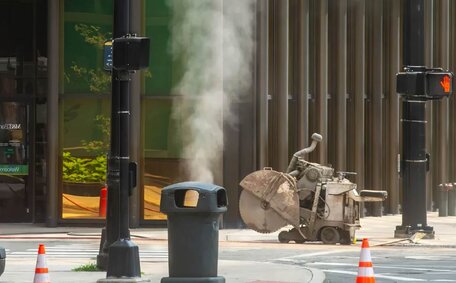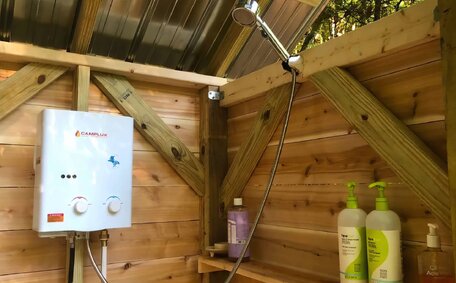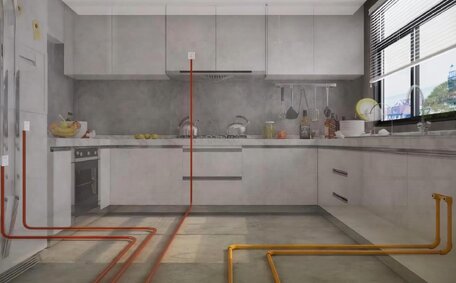
How To Move A Gas Meter
Need your gas meter relocated? You can’t move it yourself - contact your supplier to arrange for a gas engineer to reposition it safely. Charges may apply depending on circumstances.
Read MoreNatural gas is odourless by nature; a sulfur-like odour is added so residents can detect leaks. It is odourless in its pure form, so thiols and mercaptans are added to give it a distinct “rotten egg” smell to help detect leaks.
A natural gas leak could have major environmental impacts due to methane’s high global warming potential. Methane is 34 times more potent than carbon dioxide over a 100-year period, and undetected leaks allow this gas to build up, leading to significant greenhouse gas emissions.
Additionally, gas leaks pose significant threats of explosion and poisoning. Natural gas displaces oxygen in enclosed spaces, dangerously increasing gas concentration over time. Continuous inhalation of gas may result in dizziness, nausea, or unconsciousness.
If a spark or flame ignites this buildup, a powerful gas explosion can occur, causing fires, property damage, injuries, and even fatalities.
It is critical to be vigilant about gas odours and immediately know what do gas leak situations require, including taking safety precautions like evacuation, ventilation and ensuring there are no appliances running. Gas detectors offer added protection by identifying leaks in homes before they become critically dangerous.
Being aware of potential gas leak indicators is crucial. There are common indications to watch out for:
Gas detectors and regular inspections are effective for homeowners seeking to uncover hard-to-detect natural gas leaks. A swift reaction to the initial indicators can significantly mitigate the risk of a house gas incident.
Gas leaks manifest serious dangers gas hazards and the potential for explosion, risks that must never be underestimated. The risks include explosions, fires, carbon monoxide poisoning, injuries and even fatalities, which is why there should be no delay in response.
Inhaling raw gas can also lead to severe health consequences such as heart attacks, due to oxygen deprivation.
Carbon monoxide, a byproduct emitted when appliances do gas leak burning improperly, brings the hazard indoors. Known as the “silent killer”, it causes unconsciousness and death with little warning. Yearly inspections and carbon monoxide detectors are essential safeguards, especially for water heaters.
Prioritizing safety by turning off all gas appliances over convenience drastically reduces the risk of disaster. Although infrequent, gas leaks result in fatalities across the United States each year.
A gas leak can lead to explosion hazards due to the accumulation of gas, lighter than air. When gas escapes from pipes or appliances, it ascends and diffuses, merging into air. Within confined areas such as basements or crawl spaces of your home, a gas leak may result in dangerous gas accumulations near ceilings.
Natural gas becomes explosively flammable when mixed with air at concentrations of about 5%.
A single spark from devices, static, open flames, cigarettes, or light switches can effortlessly ignite natural gas.
Outdoors, one may wonder where gas accumulates heavily—it’s often in dips, hollows and near the ground where air movement is limited. If an ignition source is then introduced, escaping gas can explode with extreme intensity. Underground gas from damaged lines may leak into surrounding soil and permeate through cracks into your building, where it spreads out undetected.
Larger indoor leaks, lacking proper ventilation, elevate the risk of reaching explosive concentrations. This is why Immediate response to a leak natural gas incident, though it may seem minor initially, is critical as these conditions can rapidly compound if neglected.
Small leaks that appear inconsequential can become catastrophic over time.
Several vital steps can help prevent hazardous gas leaks and potential explosions:
In the case of a suspected gas leak, it’s wiser to exercise caution; don’t hesitate to seek multiple expert opinions.
If you smell gas or there is a suspected gas leak, immediate action is critical. Follow these steps:
Never hesitate to evacuate or call gas authorities for help if you suspect a gas leak, even if unsure a leak exists. It is always safest to operate on the assumption there is a gas leak until proven otherwise by experts.
Professional plumbers play a vital role in ensuring natural gas safe through their extensive training, expertise and diligent inspections. As licenced gas fitters, they are uniquely qualified to detect, diagnose and repair leaks while meeting strict safety codes.
Routine inspections by licensed professionals are crucial for maintaining gas systems and locating leaks swiftly. Specialists employ sophisticated techniques and careful monitoring to identify leak sources, examining all gas appliances, fittings, and connections for faulty components. Quickly addressing even small identified leaks is crucial to prevent worsening and ensure safety.
Professionals configure appliances for efficient gas burning, preventing incomplete combustion and the risk of carbon monoxide poisoning.
In the event of a gas leak natural gas or malfunctions, plumbers can rapidly respond to make repairs and restore gas supply safety. They also provide guidance on when evacuation is necessary and how to immediately secure a natural gas safe environment.
At Menai Plumbing, we prioritise natural gas safety as your trusted local experts. To learn more or have your gas appliances and fittings inspected annually, contact us today on 1300 349 338 or email [email protected].
Need your gas meter relocated? You can’t move it yourself - contact your supplier to arrange for a gas engineer to reposition it safely. Charges may apply depending on circumstances.
Read MoreInvesting in a solar hot water system can save up to 75% on water heating costs. With great returns and added home value, solar hot water can be a smart choice over electric or gas heaters. Contact us to see if it’s the right investment for your home.
Read MoreWhile natural gas and propane can both power appliances in your home, they have notable differences when it comes to BTU output, infrastructure, safety, cost and more. Understanding these key contrasts will help you determine which is better for your specific needs.
Read MoreMenai, 2234 NSW
We will call back as soon as possible.




